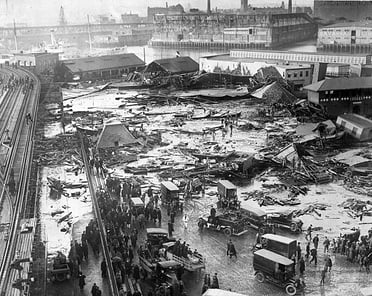

Enginering Ethics Education Research
This photograph shows the aftermath of the Great Molasses Flood, which occurred on January 15, 1919, in Boston, Massachusetts. The wave of molasses killed 21 people and injured 150. It left the area smelling of molasses for decades. The successful class-action lawsuit against the United States Industrial Alcohol Company ushered in a new age of corporate regulation. Preventing destructive events such as this is one motivation behind the codes of ethics that have been created by engineering professional organizations.
The need for developing moral reasoning ability by engineers is now a recognized part of undergraduate engineering education. I am part of a research team at Doane University that is working to better understand how best to accomplish this development in our students. Our current project, funded by the National Science Foundation, is focused on the following research questions.
Research Question 1: What components of a liberal arts education contribute to the ethical development of engineering undergraduates?
Research Question 2: How does the ethical development of engineering undergraduates compare to other students at the same institution?
Photograph from Wikipedia.
